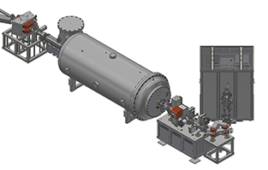A team of Univ. of Wisconsin-Madison engineers has developed a new tool to help plot the future of solar fuels.
In a paper recently published in Energy & Environmental Science, a team led by chemical and biological engineering Profs. Christos Maravelias and George Huber outlined a tool to help engineers better gauge the overall yield, efficiency and costs associated with scaling solar-fuel production processes up into large-scale refineries.
The process of converting the sun’s energy into liquid fuels requires a sophisticated, interrelated series of choices. But a solar refinery is especially tricky to map out because the designs involve newly developed or experimental technologies. This makes it difficult to develop realistic plans that are economically viable and energy efficient.
That’s where the new UW-Madison tool comes in. It’s a framework that focuses on accounting for general variables and big-picture milestones associated with scaling up energy technologies to the refinery level. This means it’s specifically designed to remain relevant even as solar-fuel producers and researchers experiment with new technologies and ideas for technologies that don’t yet exist.
Renewable-energy researchers at UW-Madison have long emphasized the importance of considering energy production as a holistic process, and Maravelias says the new framework could be used by a wide range of solar energy stakeholders, from basic science researchers to business decision-makers. The tool could also play a role in wider debates about which renewable-energy technologies are most appropriate for society to pursue on a large scale.
“The nice thing about it being general is that if a researcher develops a different technology—and there are many different ways to generate solar fuels—our framework would still be applicable, and if someone wants a little more detail, our framework can be adjusted accordingly,” Maravelias says.
In addition to bringing clarity to the solar refinery conversation, the framework could also be adapted to help analyze and plan any number of other energy-related processes, says Jeff Herron, a postdoctoral researcher in Maravelias’ group and the paper’s lead author.
“People tend to be narrowly focused on their particular role within a bigger picture,” Herron says. “I think bringing all that together is unique to our work, and I think that’s going to be one of the biggest impacts.”
Source: Univ. of Wisconsin-Madison




